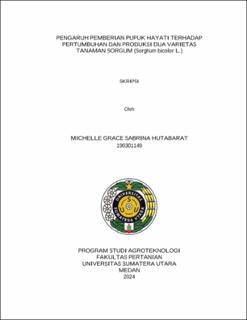| dc.description.abstract | Sorghum is a cereal crop that has wide adaptability. Sorghum is tolerant of marginal land, drought, waterlogging, and relatively resistant to pests and diseases. sorghum has the potential to be developed in order to achieve food security in Indonesia. One of the efforts to increase the production of sorghum plants is by applying biological fertilizers and using one of the superior varieties of kawali and soper-6. The research aimed to determine the effect of applying biological fertilizers on the growth and production of two varieties of sorghum plants. This research was conducted in Perdagangan Village, Bandar District, Simalungun Regency, North Sumatra Province. This research was conducted from Semptember 2023 to Januari 2024. This study used a Factorial Randomized Group Design consisting of 3 replications, and 2 treatments. Factor I sorghum varieties: kawali variety and soper-6 variety and factor II is the concentration of biological fertilizer: concentration 4% (40 ml/l water), concentration 6% (60 ml/l water) and concentration 8% (80ml/l water). Based on the research that has been done, the provision of biological fertilizers at concentration of 8% (80 ml/l water) has a significant effect on plant height, number of leaves, stem diameter, flowering age, wet stover weight, root length, panicle weight and 1000 seed weight. Plant variety also has a significant effect on plant height, number of leaves, stem diameter, flowering age, wet stalk weight, root length, panicle weight and 1000 seed weight. The interaction between the application of biofertilizer with two varieties had no significant effect. | en_US |


